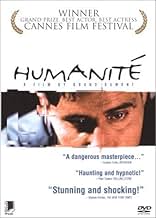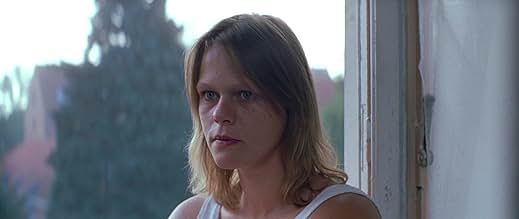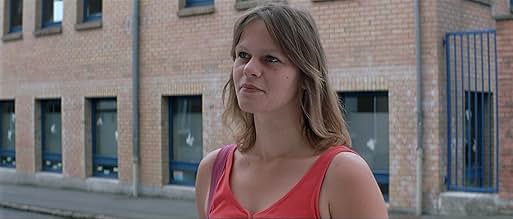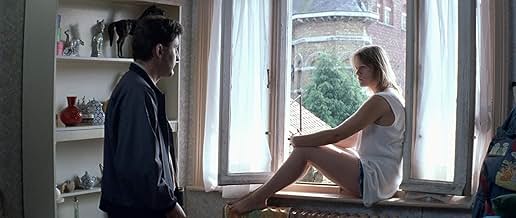When an 11-year-old girl is brutally raped and murdered in a quiet French village, a police detective who has forgotten how to feel emotions--because of the death of his own family in some k... Read allWhen an 11-year-old girl is brutally raped and murdered in a quiet French village, a police detective who has forgotten how to feel emotions--because of the death of his own family in some kind of accident--investigates the crime, which turns out to ask more questionsWhen an 11-year-old girl is brutally raped and murdered in a quiet French village, a police detective who has forgotten how to feel emotions--because of the death of his own family in some kind of accident--investigates the crime, which turns out to ask more questions
- Awards
- 3 wins & 3 nominations total
- L'infirmier
- (as Daniel Leroux)
- Le policier anglais
- (as Robert Bunzl)
- Director
- Writer
- All cast & crew
- Production, box office & more at IMDbPro
Featured reviews
While the pace of the film is slow, you do get a feeling that such an approach is necessary. As such, you get many long shots. You also get shots that are very upfront and will no doubt make many in the audience feel uneasy.
There will be many different comments about the show. I heard some French guys coming out of the cinema and lauding it as "Pure Cinema" while others have complained that it was pretentious. For me, I thought it was boring.
I agree with others who've posted here, this isn't a film for everyone. But if you are moved by the deep existential reflection and quiet, sensitive behavior of a person who can empathize out of his/her own pain, I would recommend this movie.
Still, I managed to get quite a clear impression of the film which is in my opinion a superb one. Although many people find themselves puzzled by the characters (virtually everyone in the show i attended came out of the cinema looking almost personally insulted by the film) i think that if you know and love Dostoevsky's books you won't find them so hard to understand. Pharaon is simply Prince Mishkin. He is assulted by the bluntness and cruelness of existence and the crime he tries to solve - but is overwhelmed with humility, love and compassion to the world. While his friend make love in a way that seems almost like a rape he makes love to the world, to the clods of the earth. When he rides his bicycle his upper body seems to be moving as if he was making love. But most of all he feels diligent compassion to the world and it's assaulters. The film shows the violence everywhere. Pharaon sees this violence and with his deep gaze manages to disarm it (with protesters and with Domino). I think that Pharaon is a really great acting performance. Pharaon like Mishkin in Dostoevky's notebooks 'sees not in the faces of people but in their hearts.'. The investigation taking place is like an investigation of the inner self. Of the human soul, of humanity. It's a category against Humanity and Pharaon's who is the categor manages to find compassion to humanity. Its sort of like an 'apocalypse now' in rural france.
For example, we are told Pharaon's girlfriend and child left him, but not why. Is Pharaon's sensitivity a product of his being abandoned by this woman, or was his sensitivity the cause of her leaving? Domino is clearly upset when Pharaon mentions the case of the rape/murder of the young girl, but is her reaction just empathy, or something deeper? For every detail we are given, there are often unresolved questions that are never conveniently answered.
It somewhat reminds me of a Shohei Imamrua film, like Vengeance is Mine or The Eel, in that the story unfolds through rather mundane scenes, but these scenes end up speaking volumes over the course of the film. You could also say it is a bit like Antonioni as well, as the ordinary, often bright, landscape often contributes just as much emotion as the characters. Basically, Brumo Dumont, like Imamura or Antonioni, eschews normal narrative conventions to tell a story. He lets the viewer fill in the gaps, and much of the film will always remain an engaging mystery.
Pharaon is a slow-witted police superintendent who is anything but pharaonic. He had a girlfriend and a baby, now dead. (We are not told how.) He is friends with Domino, a big-boned, sensitive, slatternly woman next door, and Joseph, her handsome beau, with whom she seems to never stop having sex. In their small town, a little girl has been raped and murdered. Pharaon pursues this case, as he pursues a sort of inarticulate love for Domino. Along the way, a light dawns in Pharaon--a dreadful light. He becomes sensitive to the suffering of all living things--a pig hurt by the suckling of her young, all the way to a motorist getting a beating outside police headquarters. The effect this has is to create a kind of moral schizophrenia in Pharaon: he can filter out nothing. Like an overlap of Raskolnikov and Prince Mishkin, Pharaon takes both the world's sin and sufferings on his back.
But this gives only the barest outline of the experience of L'HUMANITE, which is not about its plot. Indeed, the relationship of Dumont's handling of the materials of cinema to the story itself is unique in my experience of narrative moviemaking. Like Abbas Kiarostami in his recent work, Dumont uses the landscape not to illustrate the story, but to propose a dialectic against it. Where the landscape acts as an argument for life in Kiarostami's TASTE OF CHERRY, here it does something else. It vibrates with feeling. In its childlike gaze at the hardness of people and things, L'HUMANITE tries to get at the shifting feelings underneath--the emotions and sensations so elusive there are no words for them. The movie proves that literary means--finding names--are unnecessary. Dumont finds aural-visual-rhythmic means to voice those emotions.
His techniques can be daring, appalling. Pharaon, gradually overwhelmed by the world's thousand and one cruelties, starts to spontaneously embrace (relative) total strangers, in scenes one can imagine giving audiences giggles. Dumont doesn't care.
L'HUMANITE is the kind of movie that, while you're watching it, you feel can drive you crazy in places, but which you know you'll live with and re-play in your head for the rest of your life. And Cannes naysayers to the contrary, all the performances in this movie--all of them, down to the tiniest--are perfect.
A note: I would like to thank the other people who wrote about L'HUMANITE on IMDB. With no other movie have I felt I learned so much by reading other people's responses, and particularly noting the details they chose to underline. For the authenticity and unabashedness of everyone's responses, I am truly grateful.
Did you know
- TriviaThe body of the raped little girl was a silicone cast.
- Quotes
[first lines]
l'inspecteur de police Pharaon De Winter: I'm coming.
- Alternate versionsItalian distributor BIM originally removed about 2 minutes of sex footage from the Italian theatrical release in order to avoid a 'not under 18' rating. When the press criticized this self-censorship attempt, the distributor reissued the film in its original, integral form.
- SoundtracksLe Vertigo, Rondeau. Modérément
from "Pièce de Clavecin"
Music by Pancrace Royer
Performed by William Christie
Courtesy of harmonia mundi
- How long is Humanité?Powered by Alexa
Details
- Release date
- Country of origin
- Official sites
- Languages
- Also known as
- Humanity
- Filming locations
- Bailleul, Nord, France(Village)
- Production companies
- See more company credits at IMDbPro
Box office
- Gross US & Canada
- $113,495
- Opening weekend US & Canada
- $10,075
- Jun 18, 2000
- Runtime2 hours 21 minutes
- Color
- Sound mix
- Aspect ratio
- 2.35 : 1




















